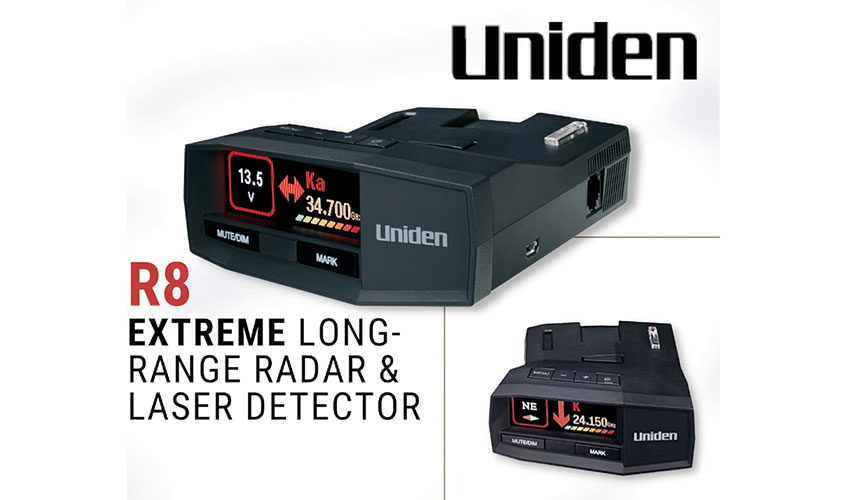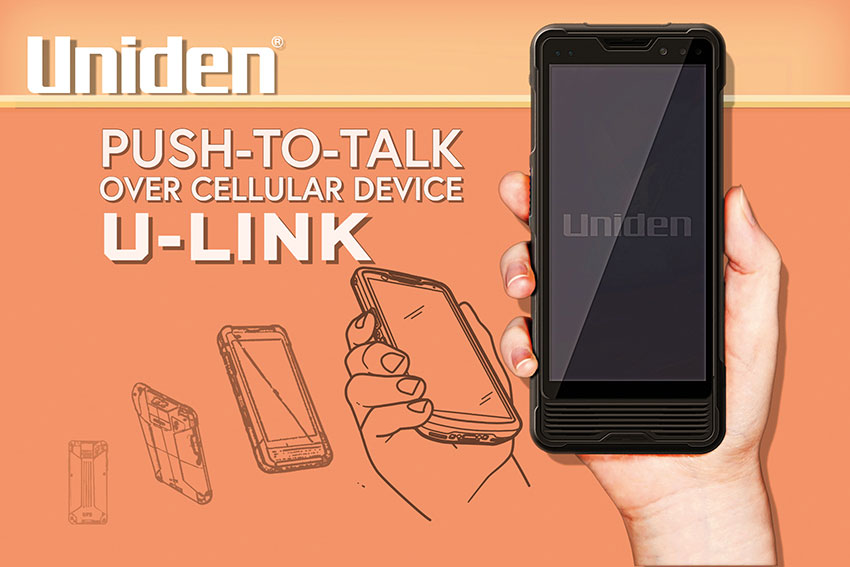Uniden Holdings strives to unite people and ideas from remote regions through the power of communication as incorporated in their extensive line-up of wireless equipment as well as cordless telephones.

Since the 90s, the Japanese consumer electronics industry has been subject to very stiff competition from regional makers in China, South Korea or Taiwan who were able to produce the same type of products at a cheaper price by taking advantage of lower labor costs and economies of scale. In such a complex environment, how are you able to remain competitive despite the market being flooded by products at a cheaper price?
From a macroeconomic perspective, it is pretty tricky for Japanese companies to acquire a massive share of the world market in various manufacturing industries compared to what we achieved in the past. However, we definitely still need to keep winning against our competitors. The weapon we can utilize in this endeavor is our technology and quality, not the price. I think those are the only options available for Japanese companies which can help them remain to have a competitive advantage.
Our strategy is to focus on the high-end models in the niche market because I firmly believe that although consumers generally pay close attention to prices, they concentrate more on technology and quality. That is how we have developed our product portfolio.
As a case in point, people inadvertently started to buy costly iPhones, which are more than JPY 100,000, instead of much cheaper Androids, at only JPY 20,000-40,000. Why do many people choose iPhones made by Apple? It is because iPhones are very advanced and do not break easily. I have both, and I can say that iPhones are more durable and reliable. Because I tell my employees that as business users, we should choose Apple, they all use Apple iPhones. It is quite essential to give more emphasis on quality over price. We believe it is a much better choice than opting for a cheaper one. Although iPhones have a vast global market, it is not an area we can go to. Our strategy is focused more on a small-sized niche market. In short, if we choose the right market segment, we could survive in the global competition. That is our manufacturing concept.
Uniden manufactures wireless communication devices that are radio based and today we live in an age where various digital means of communication are widespread – such as phones or smartwatches. Despite being overloaded with such a variety of digital devices, what remains the relevance or importance of radio-based ones?
Our strength is in the analog area rather than in digital equipment. Generally, I think one of the strengths of digitalization or digital equipment is speed. Analog is utilized for specific areas that digital equipment cannot cover. We tend to take down memos on notepads with our pens, even if a computer is already right next to us. Analog means like paper and pens have survived for a long time and will continue to do so in the future. We are aiming for that, as it can potentially be a niche market for us. Since the market size is not very big, we will not have a lot of competitors. That is precisely where we can compete and win in our business. When we started this business in our company, I thought that we should not consider digital and analog as totally different. Instead, we should think about connecting digital and analog. We tried to achieve an information technology society with a seamless connection between digital and analog. In our corporate mission described in our management mission, I have chosen two words – seamless/uninterrupted and connect. People tend to consider digital as not directly connected to analog, which is a stereotype. I believe the open areas between the two are exactly where our business or niche market will be. Because that is not a red ocean, we can compete in that specific space without competing for the price.
The automotive industry is undergoing a major shift with the adoption of CASE (Connected, Autonomous, Shared, Electric Vehicle) technologies. How can Uniden contribute to the future of in-vehicle entertainment for this next generation of cars?
Today, there are no products that can connect directly to broadband. However, we are actively developing new models in existing categories that can be linked to the user's smartphone using Bluetooth and apps.
In particular, we believe that scanners and Radar Detectors are value-added products that can be used as options for the Connected Vehicles eco-system.
We believe that PoC will encourage legacy LMR (Land Mobile Radio) users to migrate to the next generation of Connected Vehicles platform, which provides not only more stable communications but reduces the operational burden on the user-side.
In addition to the push-to-talk functionality, POC devices can be used as a smartphone.
Therefore, we believe that this will significantly change the way of driver’s communications, especially in the public safety, logistics, and transportation industries.

Uniden has had a long history, as it was founded in 1966 and expanded to the US in the late 70s. Could you quickly run us through your history and some of the key milestones in your business?
When we began our business expansion in the US with our cordless phone business, we dispatched a team led by Mr. Jack Nicklaus. We expanded our business and our company. After that, iPhones and other smartphones emerged in the market. Later, around 2010, cordless phones were not popular anymore in that area. Cordless phones are still widely used in Australia. Despite a considerable investigation, we could not find out an apparent reason for that. Maybe the popularity of smartphones is not as high as cordless phones. The root cause could be the infrastructure put in place, the number of antennas installed, or the population density in Australia. Anyway, we began our foreign expansion in the US and then in Australia, but that started to shrink.
In 1993, we started our business in China and expanded to Vietnam in 2007. Our founder, Mr. Fujimoto, thought about the need to find another country for cheaper manufacturing of our products and selling the final products to more developed countries. Unfortunately, Japanese companies, in general, experienced crises in the past. At that time, we faced that difficulty ahead of other Japanese companies. We were able to manufacture cordless phones at a cheaper cost in China. However, many Chinese companies tried to keep up with us. Due to the price competition with those emerging countries in that region, Japanese companies struggled, and we were no different. Since then, we stopped focusing on the business around cordless phones and shifted to Vietnam because of the cheaper labor cost in manufacturing our products. Currently, we cannot say that we are working very well in our Vietnam factory. I used to be the CFO for Hoya, and I was assigned to control and govern factories in Thailand, Southeast Asia, and other Asian countries. Consecutive mass production has the advantage of cheaper production, but in niche markets, we want to focus on small lots with a variety of products in our production concept. Therefore, the cost advantage in Vietnam has started to decline.
As soon as we realized that we could not make profits if we continued focusing on our conventional product portfolio, we decided to acquire Attowave. Radar/Laser detectors called R8 are high-end products, which are about USD 700 and have been selling well in the US. To compete and win the business around added-value products without stiff price competition, we bought the South Korean company, Attowave, which already has established manufacturing bases. With this acquisition, we now have manufacturing bases in Vietnam, where we assume continuous mass production, and in Korea, we are responsible for high-end, high-priced product manufacturing.

I think this acquisition last year can contribute to our future strategy. The labor cost in South Korea is high, but if we manufacture high-end models targeting a particular market, I think we can make a profit. Rather than just concentrating on consecutive mass production in Vietnamese factories, we want to try to sell high-end products at a higher price in a specific market. That could demonstrate how Japanese companies can survive and re-emerge, which is what I am trying to do. Behind the curtain, the products are made in Japan.
Why did you decide to diversify your business into the security equipment business and started manufacturing various models of cameras for security and in-vehicle dashcams?
We made the decision because of the concept of filling the gap in the clearance for connection. If people utilize our communication technology, I think it is possible to communicate about security information as well as police communication. That area is oftentimes a bidding process, so brand popularity or recognition is somehow required. In that aspect, Uniden has already established a certain reputation with its cordless phone products. Hence, we decided to penetrate this segment. Actually, that area has already turned into a red ocean, so I do not think it is valuable or meaningful for us to continue that business. We will be leaving that segment for the future. Given the size and the price, if Chinese companies can get into that segment with similar products but at lower prices, I think it is possible for them to sell a lot. Therefore, I do not want to continue that.
Our next steps are already described in our midterm business plan. We are going to enter into the Push-to-Talk over Cellular market. This coming January, we are participating in a consumer electronics show (CES2023) that will be held in Las Vegas. We are going to announce it officially. Push-to-talk over cellular looks like iPhones, and I would say it is a much more robust version of iPhones. Its communication is the same as a conventional radio, and I can easily listen to what the other person is saying because it is like a walkie-talkie.

Why have you identified that Push-to-talk niche in particular?
Reliability and quality are very critical for security devices. Even though Chinese companies have recently been trying to enter that kind of segment, governments/authorities reject their products. On the other hand, we have had a long business operation in the US for wireless communication products. For example, with regard to the police, we have established a good reputation for reliability. Leveraging those, it is easier to go into that segment.
Nobody can win a huge market share in the POC segment. They cannot survive for more than five years. In fact, there are many companies that exit that segment. Many companies that attempt to enter that segment and end up with a small share would leave, as other companies did. Nevertheless, we can view that as a business opportunity. That is the difference because we have built a good reputation with our conventional products. We have confidence in our high-quality technology around device development, and we already have business relationships in public safety and defense-related areas as well as firefighting and schools with a certain level of market share. We believe that we can acquire enough market share in that segment.
Looking at the future, what market will you prioritize, and what regions do you think are key for the future expansion of Uniden?
The US is our top priority because it is the only country in the world where a population increase can be expected, not like Japan's aging society. If we provide high-quality products at a certain price, we are sure that we can sell well in the US. The population increase means people in the US will be rich in the future, which is totally different from Japanese people. Saying this half-jokingly, Japanese people started buying Androids instead of iPhones.
With regard to the push-to-talk cellular application, you mentioned that there are currently many smaller companies in that field and that you want to be the major player. What is your strategy for doing that?
I am thinking about headhunting from major companies in the telecommunication industry. We have already won over three people from those companies.
We have already initiated serious discussions about the kind of specifications and features we should achieve with the Tier 1s in the telecommunication industry. The other day, I visited APCO 2022 in Anaheim and spent about six hours with them, a four-hour face-to-face meeting and dinner. Uniden has established a high reputation for reliability, and they have high expectations of us. We also talked about a potential hybrid proposal, including 4G and 5G.
If we were to come back in four years for Uniden's 60th anniversary in 2026, is there a personal ambition or goal that you would like to share with us that you would have achieved by then?
By then, I would want to be a professional, full-fledged CEO of the company. There are many professional CEOs in the US, but not many in Japan. When I was a university student, I wanted to be the CFO of a company. Hence, I gained a significant background in financial matters. However, given my experience and something that occurred in the past, I happened to be the CEO of this company. I do not think that I am a professional and full-fledged CEO yet. As we describe our company's vision, mission, and value in our midterm business plan, I hope that the next time you come, I will be fully established as the CEO with a particular name value. Although, at the moment, I think I am more known for my capabilities as a CFO than as a CEO. When you come back, please celebrate with me when I can achieve that personal goal.

0 COMMENTS